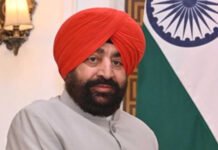INVC NEWS
Leading names of higher education in India has praised the recently-launched National Education Policy 2020 for its multidisciplinary approach and potential to transform its the education system at a webinar titled ‘Dialogue on National Education Policy 2020: Transforming Education System of India’ by IIHMR University. The leading panel members included Dr. Sandeep Sancheti, Vice-Chancellor, SRM Institute of Science and Technology; Dr. S D Gupta, Chairperson, IIHMR University; Prof. Ramesh Bhat, Vice-Chancellor, NMIMS University;Dr. Ajit K Nagpal, Chairman, Amity PACIFIC Forum, Chairman and Director General, Amity University Middle East Initiative;Prof Venkat Raman, FMS, University of Delhi; Dr. Prabhat Ranjan, Vice-Chancellor, D. Y. Patil International University; and Dr. P. R. Sodani, Pro President, IIHMR University, Jaipir.
“The NEP-2020 has the potential to transform the education system of India and keeps the sustainable development goals and societal needs in mind. It will promote speed, efficiency and diversity along with access, equity, quality, accountability, and transparency,” said Dr. Sandeep Sancheti, Vice-Chancellor, SRM Institute of Science and Technology.
“We have in the past campaigns to improve access to education such as Right to Education Act and Integrated Child Development Services (ICDS). The policy now will require out-of-the-box thinking and willingness to adopt it. The new education policy is a path-breaking one and will help the younger generation with the new competencies required in the 21st century,” said Dr. S D Gupta, Chairperson, IIHMR University. Dr. Gupta was also chairing the session.
“NEP has a significant footprint on liberal education all over. The policy has made a very impressive argument of moving from a single-disciplinary university system to a multidisciplinary approach and from a fragmented and siloed education system to an integrated system of education, giving us ways of handling the challenges by placing the universities into broad categories,” said Prof. Ramesh Bhat, Vice-Chancellor, NMIMS University.
Speaking about the National Education Policy’s objectives, Prof. Rajendra P Gupta, a former member of the NEP-2020 committee, said, “We have not attended education since the Kothari Commission. The policy’s objective is to bring district-level self-sufficiency in education, reduce regulatory hurdles, and reduce artificial barriers by de-siloing education.”
Highlighting the policy’s focus on arts and humanities along with science, Dr. Ajit K Nagpal, Chairman, Amity PACIFIC Forum, Chairman and Director General, Amity University Middle East Initiative; and Former Health Advisor to the UAE Government, said, “The country’s identity, upliftment, spiritual and intellectual satisfaction, and creativity can be attained through learning about its history as well as art and culture. Research in arts and humanities and science and innovation will take the country forward in becoming a developed nation. This policy rightly addresses the way forward.”
“The University of Delhi had employed a Four-Year Undergraduate Program (FYUP), which caused much heartburn. The implementation of the policy should be taken seriously – there are 100 million teachers who need to become change partners; if we don’t carry them along, then there will be major trouble in implementing this education policy,” says Prof Venkat Raman, FMS, University of Delhi.
“The policy allows common entrance tests for all students, but there should be multiple parameters for assessing the complete process, focusing on all areas and not only any single parameter. All regulatory bodies should be merged to improve India’s education system,” said Dr. Prabhat Ranjan, Vice-Chancellor, D. Y. Patil International University.
Dr. P. R. Sodani, Pro President, IIHMR University, and Moderator of the webinar said that the NEP emphasized that NEP intends to ensure equitable access to the highest level of quality education to all the learners irrespective of their socio-economic background.
As envisioned by the NEP-2020, the new education universe should address the mental health of students in the Indian higher education and focus on employable skilling, a student representative at the webinar said.
“The aspect of students’ mental health should be majorly highlighted as India has the highest rates of suicide cases. Many students face undignified behavior due to different personality shades, which also contributes to their poor mental health. We must focus more on employable skilling, considering the creativity of students, and employable education so that students have a job after completing their education,” said Rishabh Singh, a student representative from IIHMR University.















